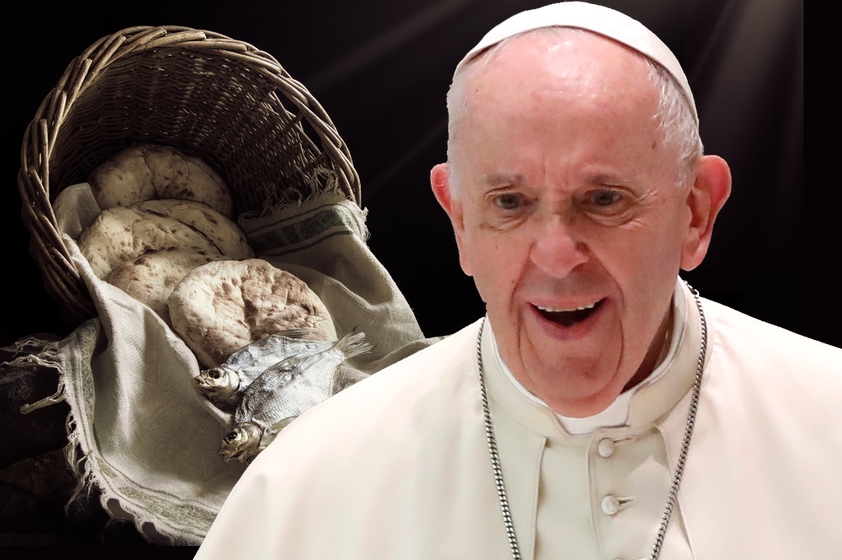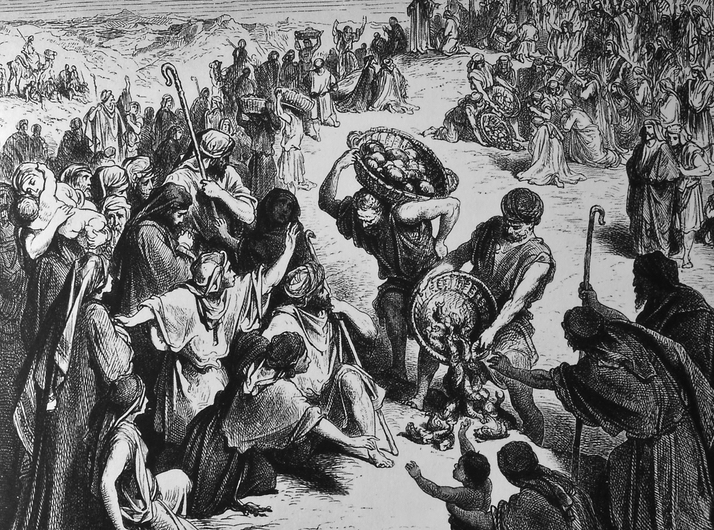“…but what are these among so many?” (Jn 6:9)
A “Miracle of Sharing, Not Multiplying”:
Francis on Christ’s Feeding of the Five Thousand

Yesterday, on May 30, 2022, the world’s most talkative Jesuit, “Pope” Francis, gave an address to participants in the General Chapters of the Poor Servants of Divine Providence, gathered at the Vatican.
The man more properly known as Jorge Bergoglio did not fail to include some fancy Novus Ordo terminology in his speech. For example, he spoke of the “prophecy of communion”, “creative fidelity”, a “culture of providence”, “sterile nostalgia”, and the “dream of God”. Mention was also made of the “paternal and maternal face of God”. No doubt some people were impressed.
Less than impressive, however, was the unceremonious mention the false pope made of the miracle of the multiplication of the loaves worked by our Blessed Lord Jesus Christ in the Gospels (see Mt 14:15-21; 15:32-39; Mk 6:34-45; Lk 9:12-17; Jn 6:5-16). Not that he denied it outright; rather, he downgraded it to a “miracle of sharing”, which worked much better for his narrative.
Let us take a look at the full paragraph for context:
I would like to emphasize again the aspect of sharing, because it seems to me to be an essential part of the “prophecy of communion” on the basis of which you wish to journey together. And I do so by recalling the example given to us by our elders, our grandparents. For them, when a guest came to the house unexpectedly, or when a poor person came knocking for help, it was normal to share a plate of soup, or polenta. This was a very concrete way of experiencing Providence, as sharing. We must not idealize that world, nor take refuge in sterile nostalgia, but we must recover certain values: the mentality of those who break bread while blessing God the Father, trusting that that bread will be enough for us and for our neighbour in need. This is how Jesus Christ taught us in the miracle of sharing – not multiplying – the loaves and fishes. Today we need Christians who serve Providence by practising sharing. And to do this openly and sincerely, not like Ananias and Sapphira (cf. Acts of the Apostles 5:1-11), no: openly.
(Antipope Francis, Audience with the Participants in the General Chapters of the Poor Servants of Divine Providence [Don Calabria], Vatican.va, May 30, 2022; italics given; underlining added.)
Sharing is a wonderful thing and quite important. In some situations it can even be so necessary to share something with another that to refuse to do so would constitute a mortal sin. However, our Lord’s miracle is called the miracle of the multiplication of the loaves and not the miracle of the sharing of the loaves, and there is good reason for that.
Before we get into more detail on that, notice that Francis does not simply assert that the miracle involved sharing, which is how one could look at the action of breaking and distributing the miraculous loaves. However, Francis does more than simply emphasize the sharing aspect of the miracle. He explicitly denies that there was a multiplication: “This is how Jesus Christ taught us in the miracle of sharing – not multiplying – the loaves and fishes” (original Italian: “Così ci ha insegnato Gesù Cristo nel miracolo della condivisione – e non moltiplicazione – dei pani e dei pesci”).
If we consult the Great Commentary of Fr. Cornelius à Lapidé (1567-1637) on the account of the miracle in St. Matthew’s Gospel (14:15-21; 15:32-39), we find him mentioning the idea of multiplication quite consistently, again and again:
[Chapter 14] Verse 18. Who said to them: Bring them hither to me. That He might multiply them by His benediction. [p. 54]
[Verse 19] …and He also blessed the loaves themselves (He called down divine grace upon them, by which they might be multiplied, and acquire strength and efficacy to nourish, strengthen, and cheer so great a multitude abundantly, as though they had been fed upon a rich feast of meat and wine). Therefore, Christ by this benediction endued these loaves with a certain virtue, not physical, but moral; that is to say, He ordained and appointed them for miraculous multiplication, whereby He placed His hand, as it were, i.e., His own divine power upon the loaves, that they should straightaway be really multiplied. And this, indeed, He did by converting the neighboring atmosphere, or some other material gradually, but imperceptibly and continuously, into bread while the loaves were being distributed. For God creates no thing anew out of nothing, but produces and transforms all things from the matter which was created at the beginning of the world. In a similar manner He multiplied the meal and the oil of the widow of Sarephta, for the sake of Elias (3 Kings 17:14), and again for the sake of Eliseus (4 Kings 4:5). That these loaves were most excellent, and endowed with great power to nourish, strengthen and cheer those who were provided with them, is plain from this, that they were divine loaves, miraculously produced by Christ. [p. 55]
[Verse 20] … It is probable Christ first broke the five loaves with His own hands, and in breaking multiplied them, and placed them in these baskets for distribution. These were afterward, by His command, distributed by the Apostles to the different companies, and were gradually more and more multiplied; thus they brought back to Christ as many baskets of fragments as they had received baskets of loaves from Him at the beginning. Thus Maldonatus. [p. 58]
[Chapter 15, Verse 36.] … Christ, being God, was able to multiply the loaves by Himself, at His command, but as a man He customarily prays God that He might supply the power for this miracle. Thus it seems obvious that Christ, after giving thanks, made the Sign of the Cross over the loaves and blessed them, and by blessing them gradually and continually multiplied them amongst those who broke and distributed them, as He did in chapter 14, verse 19. [p. 94]
(The Great Commentary of Cornelius à Lapide: The Holy Gospel according to Saint Matthew, Vol. II, trans. by Thomas W. Mossman, rev. and compl. by Michael J. Miller [Fitzwilliam, NH: Loreto Publications, 2008]; italics given; underlining added. Alternate edition with different translation available here.)
This commentary is clear and speaks for itself. There is, then, no justification for denying the miraculous multiplication of the loaves on the grounds of sharing or distributing the food.

Not much sharing here: Scene from an illustration of the multiplication
of the loaves and fishes by Gustave Doré (image: Shutterstock/ruskpp)
From the beginning of his fake pontificate, Francis has had a problem with Our Blessed Lord’s multiplication of the bread and the fish. Let’s look at just two examples.
On June 2, 2013, during his weekly Angelus address, Francis claimed: “This is the miracle: rather than a multiplication it is a sharing, inspired by faith and prayer. Everyone eats and some is left over: it is the sign of Jesus, the Bread of God for humanity.”
In a video message to Caritas Internationalis of Dec. 9, 2013, Bergoglio spoke of the “parable [!] of the multiplication of the loaves and fish” that supposedly “teaches us exactly this: that if there is the will, what we have never ends. On the contrary, it abounds and does not get wasted.” That is definitely not what Christ’s multiplication of the loaves was about, which was a real historical event and genuinely miraculous — it was not a parable Christ told.
The professional Francis defender Jimmy Akin, star apologist at Catholic Answers, rushed to Bergoglio’s defense; however, we thoroughly dismantled his attempts to excuse the inexcusable:
During his Lenten retreat of 2016, Francis listened without objection as “Fr.” Ermes Ronchi, OSM, used the account of the multiplication of the loaves to talk about sharing while dropping some veiled sneers at the Holy Eucharist. For example, he proclaimed: “There is bread in abundance. We don’t need to multiply it, we just need to distribute it, beginning with ourselves. We don’t need miraculous multiplications; we need to beat the Goliath of selfishness, of wasting food and accumulation by a few.” Needless to say, we mopped the floor with that Modernist:
- Sharing the Loaves: Modernist Drivel at “Papal” Retreat (Mar. 10, 2016)
The last thing that should be pointed out about Bergoglio’s May 30, 2022, address denying the multiplication of the loaves is that even if there were some complex orthodox interpretation of his words, that is not what was communicated, since the false pope did not explain his words at all. Consequently, the countless people who have read or listened to his remarks have now learned that the “Pope” teaches that there was no miraculous multiplication of loaves but merely a sharing. That, of course, is exactly what Francis intended to accomplish. Any plausible deniability — not that there is room for any here — is always only for the hapless apologists still defending him.
Clearly, a warm and sentimental sharing fits Francis’ narrative much better than a cold and dispassionate multiplication of loaves and fish that were distributed. What narrative? That of making Catholicism ultimately about serving others through the corporal works of mercy, a message that is entirely compatible with any and no religion, with his “human fraternity” agenda, and with his insufferable Naturalism.
The salvation of souls, on the other hand, is per se a supernatural matter. It requires final perseverance in sanctifying grace, and this grace cannot be obtained without Faith in Jesus Christ (see Mk 16:16; Eph 2:8-9; Heb 11:6), whose true miracle of the multiplication of the loaves proves His Divinity.
Do you see what Francis did there?
Title image source: composite with elements from Shutterstock (Riccardo De Luca – Update; ArtMari)
License: paid



No Comments
Be the first to start a conversation